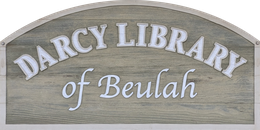Helen Tanner American Indian History Collection
In 2008, Dr. Helen Hornbeck Tanner -- local resident, expert on the history of American Indians in the Great Lakes region and fellow of the Newberry Library -- donated her personal research collection to the Darcy Library of Beulah. She did so with the stipulation that the library house the collection in its American Indian Room, that the collection would circulate publicly, and that the library would promote the collection so it could be of value to American Indian communities, students, scholars, and the general public. Thanks to dedicated staff and volunteers, over 600 books, maps, manuscripts, and pamphlets have been processed, cataloged, and compiled into an annotated bibliography.
Helen Hornbeck Tanner was a major figure in the study of “new Indian culture” and a senior fellow at the Newberry Library in Chicago. She died on June 15, 2011, at her lake home in Beulah at the age of 94.
Tanner was born in 1916 and raised in Michigan where her mother was dean of women at Kalamazoo College. She was part of a generation of female scholars initially not welcome into the halls of academe, and her ideas were not always taken seriously by her male contemporaries. She went on to graduate with honors from Swarthmore College in 1937, married psychologist Wilson Tanner, and raised four children in Ann Arbor, Michigan, before receiving the PhD in history from the University of Michigan in 1961. Tanner was an early and passionate advocate for women's equality and education. In 2006, Tanner was inducted into the Michigan Women's Hall of Fame for achievement in history and American Indian rights.
Trained as a Latin Americanist, Tanner discovered a new calling in middle age as a scholar who partnered with American Indians, serving as an expert witness on behalf of Great Lakes tribes in 16 cases before the Indian Claims Commission from 1962 through 1972. She was recognized as an authority and a friend, especially to the Ojibwe and Odawa people of her Great Lakes home region.
As background to her most recognized study and publication, The Atlas of Great Lakes Indian History, Tanner said that that in those days there was very little information about Great Lakes Indians on record. She said earlier historians and anthropologists lacked interest in the region.
"There were too many Indian Tribes involved and it was too complex a picture," she said. "That's the time I decided I would try to make maps."
Tanner's Atlas of Great Lakes Indian History documented the Indian presence and dispossession, using research from the maps and resources of the Newberry Library of Chicago and other state and local history resources. Never retiring and in her 80s, Tanner worked on the landmark case Minnesota v. Mille Lacs Band of Chippewa Indians, which ended at the U.S. Supreme Court in 1999. Ojibwe living in states including Wisconsin and Minnesota were harassed when they exercised 1837 treaty rights by hunting, fishing and gathering in their homelands. The court ruled for the Ojibwe rather than the state of Minnesota. Her research also helped convince Federal District Judge Noel Fox that five tribes in northern Michigan still have hunting and fishing rights under a treaty signed in 1836.
Tanner was instrumental in the establishment of the Newberry Library’s Frances C. Allen Fellowship, which supported American Indian women pursuing postgraduate degrees. Her academic legacy continues through the Susan K. Power and Helen Hornbeck Tanner Fellowships for American Indian scholars.
SOURCES: Brenda J. Child; University of Minnesota; American Historical Association & Peter Payette; Interlochen Public Radio
